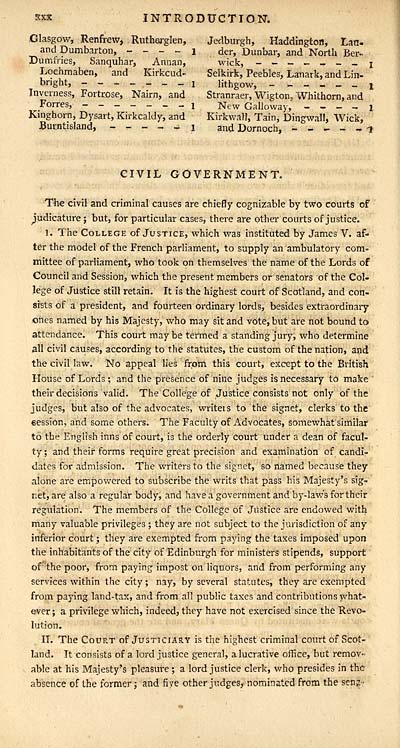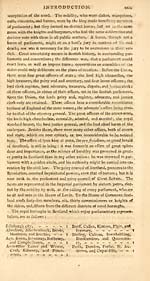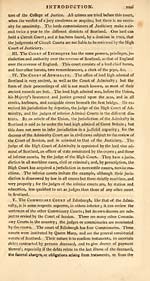Gazetteer of Scotland
(42) Page xxx
Download files
Complete book:
Individual page:
Thumbnail gallery: Grid view | List view

xxx INTRODUCTION.
Glasgow, Renfrew, Rutherglen, Jedburgh, Haddington, Lan-
and Dumbarton, - - - - 1 der, Dunbar, and North Ber~
Dumfries, Sanquhar, Annan, wick, ---____ j
Lochmaben, and Kirkcud- Selkirk, Peebles, Lanark, and Lin-
bright, --_____! lithgow, - - - - - - %
Inverness, Fortrose, Nairn, and Stranraer, Wigton* Whithorn, and
Forres, --____-! N ew Galloway,' - - - - i
Kmghorn, Dysart, Kirkcaldy, and Kirkwall, Tain, Dingwall, Wick,
Burntisland, - - - - - i and Dornoch, --.___ 1
CIVIL GOVERNMENT.
The civil and criminal causes are chiefly cognizable by two courts of
judicature ; but, for particular cases, there are other courts of justice.
I. The College of Justice, which was instituted by James V. af-
ter the model of the French parliament, to supply an ambulatory com-
mittee of parliament, who took on themselves the name of the Lords of
Council and Session, which the present members or senators of the Col-
lege of Justice still retain. It is the highest court of Scotland, and con-
sists of a president, and fourteen ordinary lords, besides extraordinary-
ones named by his Majesty, who may sit and vote, but are not bound to
attendance. This court may be termed a standing jury, who determine
all civil causes, according to the statutes, the custom of the nation, and
the civil law. No appeal lies from this court, except to the British
House of Lords ; and the presence of nine judges is necessary to make
their decisions valid. The College of Justice consists not only of the
judges, but also of the advocates, writeis to the signet, clerks to the
cession, and some others. The Faculty of Advocates, somewhat similar
to the English inns of court, is the orderly court under a dean of facul-
ty; and their forms require great precision and examination of candi-
dates for admission. The writers to the signet, so named because they
alone are empowered to subscribe the writs that pass his Majesty's sig-
net, are also a regular body, and have a government and by-law's for their
regulation. The members of the College of Justice are endowed with
many valuable privileges ; they are not subject to the jurisdiction of any
inferior court ; they are exempted from paying the taxes imposed upon
the inhabitants of the city of Edinburgh for ministers stipends, support
of' the poor, from paying impost on liquors, and from performing any
services within the city ; nay, by several statutes, they are exempted
from paying land-tax, and from all public taxes and contributions what-
ever ; a privilege which, indeed, they have not exercised since the Revo-
lution.
II. The Court of Justiciary is the highest criminal court of Scot-
land. It consists of a lord justice general, a lucrative office, but remov-
able at his Majesty's pleasure ; a lord justice clerk, who presides in the
absence of the former ; and five other judges, nominated from the sens-
Glasgow, Renfrew, Rutherglen, Jedburgh, Haddington, Lan-
and Dumbarton, - - - - 1 der, Dunbar, and North Ber~
Dumfries, Sanquhar, Annan, wick, ---____ j
Lochmaben, and Kirkcud- Selkirk, Peebles, Lanark, and Lin-
bright, --_____! lithgow, - - - - - - %
Inverness, Fortrose, Nairn, and Stranraer, Wigton* Whithorn, and
Forres, --____-! N ew Galloway,' - - - - i
Kmghorn, Dysart, Kirkcaldy, and Kirkwall, Tain, Dingwall, Wick,
Burntisland, - - - - - i and Dornoch, --.___ 1
CIVIL GOVERNMENT.
The civil and criminal causes are chiefly cognizable by two courts of
judicature ; but, for particular cases, there are other courts of justice.
I. The College of Justice, which was instituted by James V. af-
ter the model of the French parliament, to supply an ambulatory com-
mittee of parliament, who took on themselves the name of the Lords of
Council and Session, which the present members or senators of the Col-
lege of Justice still retain. It is the highest court of Scotland, and con-
sists of a president, and fourteen ordinary lords, besides extraordinary-
ones named by his Majesty, who may sit and vote, but are not bound to
attendance. This court may be termed a standing jury, who determine
all civil causes, according to the statutes, the custom of the nation, and
the civil law. No appeal lies from this court, except to the British
House of Lords ; and the presence of nine judges is necessary to make
their decisions valid. The College of Justice consists not only of the
judges, but also of the advocates, writeis to the signet, clerks to the
cession, and some others. The Faculty of Advocates, somewhat similar
to the English inns of court, is the orderly court under a dean of facul-
ty; and their forms require great precision and examination of candi-
dates for admission. The writers to the signet, so named because they
alone are empowered to subscribe the writs that pass his Majesty's sig-
net, are also a regular body, and have a government and by-law's for their
regulation. The members of the College of Justice are endowed with
many valuable privileges ; they are not subject to the jurisdiction of any
inferior court ; they are exempted from paying the taxes imposed upon
the inhabitants of the city of Edinburgh for ministers stipends, support
of' the poor, from paying impost on liquors, and from performing any
services within the city ; nay, by several statutes, they are exempted
from paying land-tax, and from all public taxes and contributions what-
ever ; a privilege which, indeed, they have not exercised since the Revo-
lution.
II. The Court of Justiciary is the highest criminal court of Scot-
land. It consists of a lord justice general, a lucrative office, but remov-
able at his Majesty's pleasure ; a lord justice clerk, who presides in the
absence of the former ; and five other judges, nominated from the sens-
Set display mode to: Large image | Transcription
Images and transcriptions on this page, including medium image downloads, may be used under the Creative Commons Attribution 4.0 International Licence unless otherwise stated. ![]()
| Gazetteers of Scotland, 1803-1901 > Gazetteer of Scotland > (42) Page xxx |
|---|
| Permanent URL | https://digital.nls.uk/97415066 |
|---|

